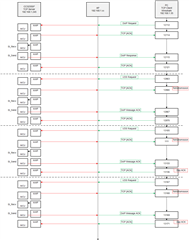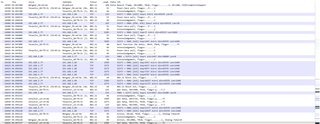Other Parts Discussed in Thread: UNIFLASH, SYSCONFIG,
I have used wireshark on my PC to measure the time from the receive message to the message ACK from the device.
7243 594.265997 192.168.1.35 192.168.1.22 68 Request
7253 595.165183 192.168.1.22 192.168.1.35 67 message ACK
I have an application running FREERTOS
It has 2 threads
sl_Task thread
and socket thread.
the socket thread is as follows.
void *SocketThreadFxn(void *arg0)
{
(void) arg0;
connect_wifi_with_provisioning();
while(1) // !e716 while1
{
Process_TCP_Server();
}
The Process server functions first connect the sockets then go into toggling between read (non blocking) and send (if there is data to send).
Additional code can be sent on request.







